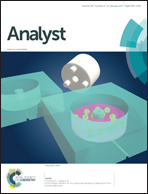A gas-phase amplified quartz crystal microbalance immunosensor based on catalase modified immunoparticles†
Abstract
A novel signal amplification strategy for quartz crystal microbalance (QCM) based on catalytic gas generation was developed to construct an ultrasensitive immunosensor for the detection of proteins (immunoglobulin G, IgG, used as a model). A catalase modified immunoparticle was prepared to form a sandwich-type immunocomplex with the IgG and anti-IgG antibodies that were immobilized on the QCM sensor. The amount of immunoparticles on the sensor surface was thus controlled by the IgG concentration. Then H2O2 was added and catalyzed by catalase for oxygen generation. The generated oxygen replaced some of the liquid on the sensor surface, leading to the change in the shear modulus of the immunocomplex layer and the apparent viscosity and density of the liquid layer. Due to the ultrasensitive response of QCM to these changes, a significant frequency shift related to the IgG concentration was achieved. Different parameters, including the flow cell structure, operation temperature, immunoparticle concentration, and H2O2 concentration were optimized to achieve steady and efficient frequency shifts. Under the optimal conditions, the proposed gas-phase amplified QCM sensor could achieve up to 72 times improvement of detection sensitivity compared to the label-free sensor as a control, in the concentration range of 0.1–3.0 μg mL−1. The detection limit was also reduced from 236 ng mL−1 to 51.0 ng mL−1 at the 3Sblank level.


 Please wait while we load your content...
Please wait while we load your content...